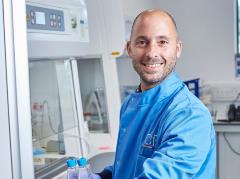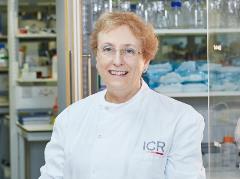“The ICR’s research has proved miraculous for me. My treatment has given me a new lease of life.” Rob Lester, from Fife in Scotland, is living well with cancer thanks to the targeted drug abiraterone, which we discovered. Hear his story.
Our progress against prostate cancer
We’ve long been at the forefront of precision cancer medicine. In the past two decades, targeted drugs that we’ve discovered have extended cancer patients’ lives. This includes abiraterone, which is now a routine treatment for advanced prostate cancer, improving the lives of hundreds of thousands of men worldwide.
More recently, olaparib – an innovative precision medicine already licensed for breast and ovarian cancer – became the first gene-targeted medicine to show benefits in prostate cancer. It has now been approved for some men with advanced prostate cancer in the US and EU.
Changing clinical practice using radiotherapy
Cancer treatment can be very tough on patients, with countless hospital visits and side-effects from therapies adding to the distress of a cancer diagnosis. We lead the way in developing new, more targeted forms of radiotherapy for prostate cancer, which leave patients with fewer side-effects and delivers more cancer killing radiation to the tumour itself.
The CHHiP trial, led by the ICR and our partner hospital The Royal Marsden, showed that fewer, larger doses of radiotherapy for prostate cancer were just as effective as the standard regime. This led to changes in clinical guidance, sparing patients the inconvenience of unnecessary hospital visits.
Sign up for news
Modelling prostate cancer evolution, from patient to patient
 Dr Marco Bezzi recently joined our impressive cohort of prostate cancer researchers. He is researching how the complex cell ecosystems within prostate tumours evolve to help the cancer become resistant to drugs, and he is looking to find new ways to overcome this.
Dr Marco Bezzi recently joined our impressive cohort of prostate cancer researchers. He is researching how the complex cell ecosystems within prostate tumours evolve to help the cancer become resistant to drugs, and he is looking to find new ways to overcome this.
Diseases like prostate cancer are caused by mutations that build up in cancer cells. Dr Bezzi is using lab-grown mini-tumours called organoids that closely resemble cancer, to better understand how prostate cancer evolves. By understanding how tumours are able to deceive the immune system and resist treatment, he aims to develop new ways to overcome this resistance.
Catching prostate cancer early saves lives
 Professor Ros Eeles is Professor of Oncogenetics. Her team analyses DNA from thousands of men with and without prostate cancer, to try to find genetic clues about the disease. They have discovered over 150 genetic factors that influence a man’s chance of developing prostate cancer, and whether his disease is likely to be aggressive – a major step forward for a disease that can progress rapidly in some patients but remain harmless in others.
Professor Ros Eeles is Professor of Oncogenetics. Her team analyses DNA from thousands of men with and without prostate cancer, to try to find genetic clues about the disease. They have discovered over 150 genetic factors that influence a man’s chance of developing prostate cancer, and whether his disease is likely to be aggressive – a major step forward for a disease that can progress rapidly in some patients but remain harmless in others.
If prostate cancer is caught early, the chance of being alive five years after diagnosis is more than 90 per cent. By identifying the genetic variants that increase the likelihood of prostate cancer in the population, Professor Eeles is improving our understanding of why prostate cancer develops – so we can design targeted treatments and prevention programmes.
She now aims to develop tests for prostate cancer risk which could be used in patient screening. If we can tell from DNA testing how likely it is that a man will develop prostate cancer, we could use that information to develop a monitoring programme to catch the disease early – or even prevent it altogether.
Sign up for more news
Our work is made possible with the help of our supporters. Our brilliant fundraisers, who are doing so much to support our work, are an important part of our community.
Together we have made major progress in cancer research, and with your help we can do so much more.